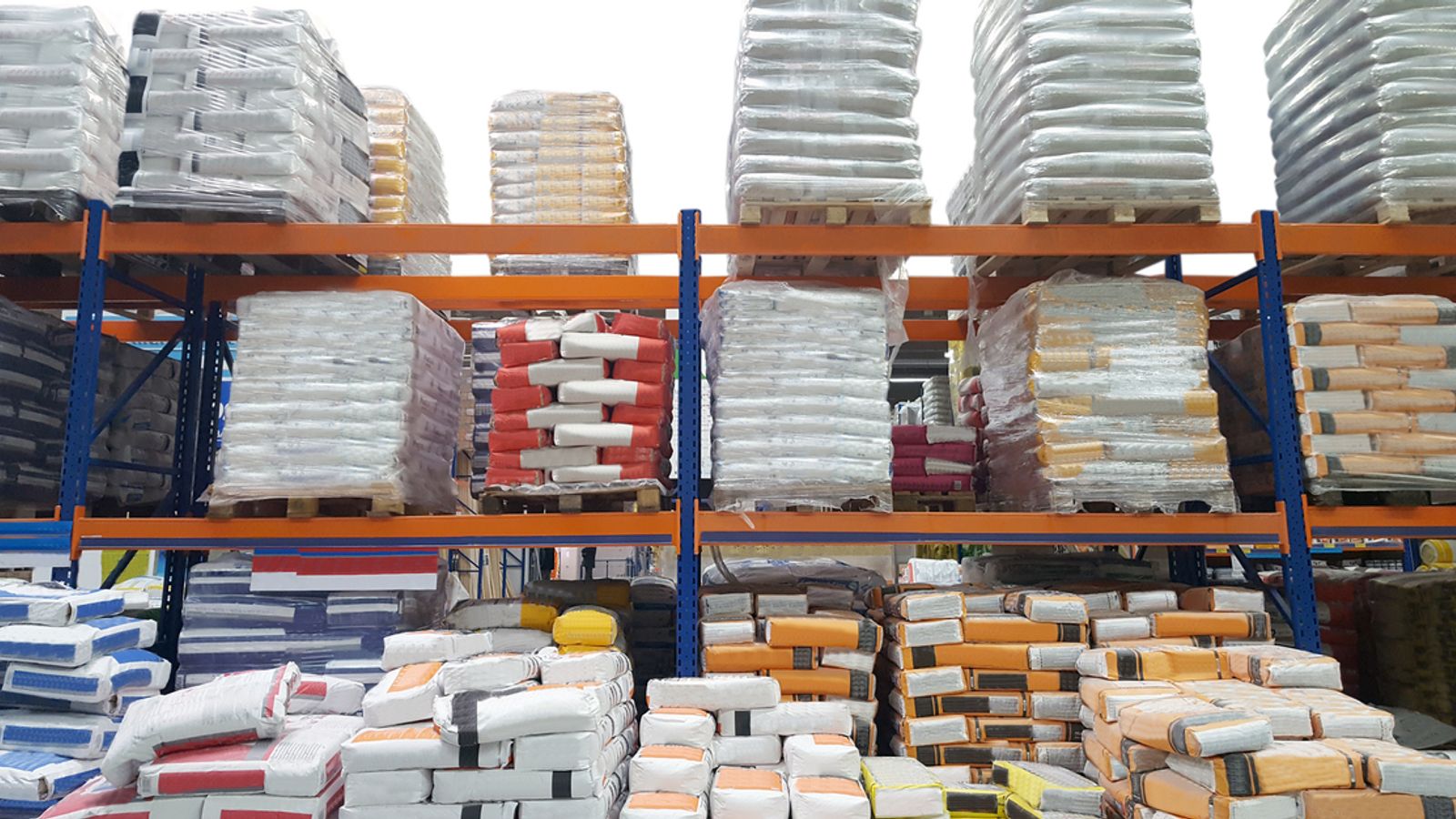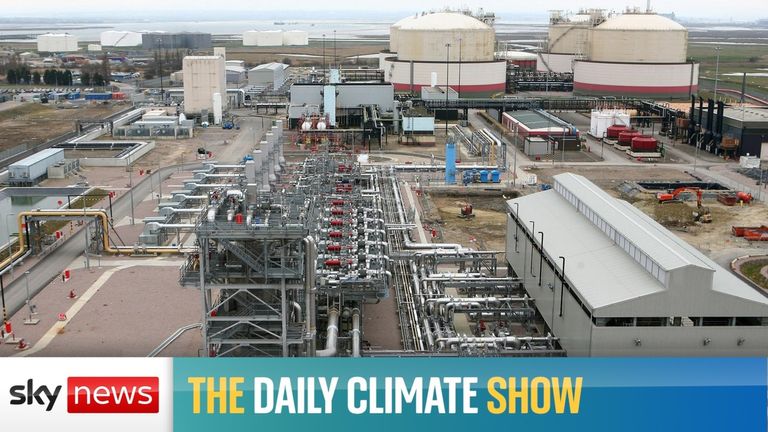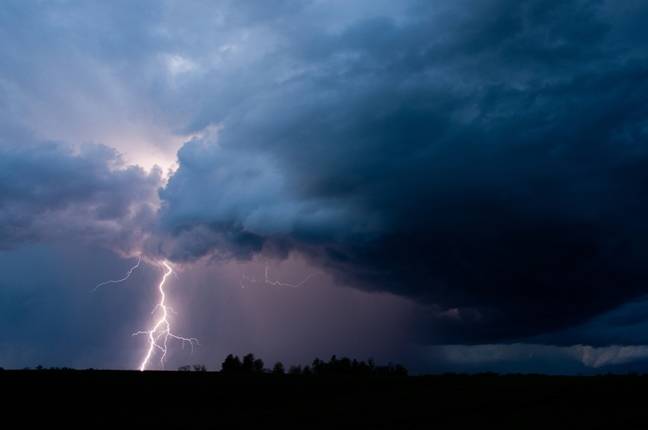Economy
Breakfast rates are outdated by tea time – and this business is starting to suffer | Business news

Riteweld Engineering builds the skeletons for the modern economy.
In her Banbury business, she takes steel bars, cutting, welding, and drilling to create frames for warehouses, shops, and restaurants.
It buys steel by the ton, but in recent weeks it has seen unprecedented fluctuations in the prices of raw materials, due to the global rise in natural gas prices. This means that the quote given at breakfast is outdated by tea time.
« We could take the phone to a supplier in the morning and by the afternoon we could have seen a £20 per ton increase in cost, » says manager Ben Young.
He says quotes from suppliers are now only good for a day, and contracts agreed months ago can now only be completed at a loss.
“When I quote a quote for a client, I say I can only keep it for a few days because the supplier I deal with will not keep their cost for more than a number of hours, and when I come back to place my order, before I process it through the design office, the price has gone up again.”
The result is a slowdown in business that may get worse.
He added, « Now we’re finding a little bit of uncertainty, clients say maybe I’ll put off and leave this building until the new year. Right now we’re fine, but for us it’s the uncertainty that’s the problem. »
Companies like Riteweld are suffering because of the challenge to the supply chain, as energy-intensive industries such as steel, paper, chemical production, and ceramics become unviable due to energy costs.
Natural gas prices are about six times higher than they were last year, which puts a premium on electricity during the fall when calm weather reduces renewable power generation.
And unlike domestic customers who are partially protected from price hikes by a cap that is renewed twice a year, there is no limit on industrial use.
Energy-intensive industry leaders spent Friday and most of Monday in talks with ministers and officials, warning that factory closures and even permanent closures are a very real possibility.
Government sources say ministers believe the warnings are stark and credible, and not just private pleas on behalf of companies under pressure. The basic calculation is that those asking were competitive, self-sufficient companies until a month ago, when price hikes skewed their financial model.
What to do about it is a more complex and costly question, and it may explain the awkward and notable weekend feud between Kwasi Kwarting and Rishi Sunak.
In short, a Treasury source accused the business secretary of lying when he said talks were underway on how to help the industry. A day later, sources confirmed there was an « official request » for help from the Treasury.
Mr. Sunak’s reluctance to tell you that whatever it takes, it will be costly. The industry has proposed a series of « winter containment measures », which provide support for higher short-term bills.
But it also wants the Treasury to deal with the additional costs, many of which are linked to the climate, and which it says make energy costs for British companies 80% more expensive than German rivals.
« It’s not about supporting our industry, » said Gareth Steess of UK Steel industrial group. “It’s about putting us on a level playing field with Germany. The government is accumulating the costs of fines, renewables, transmission, distribution, capacity, and carbon costs that our competitors bear directly that our competitors do not.
« We’ve said for years that they need to solve this to make us competitive and then we can hire more people and give more to taxpayers. »
With the UK hosting the COP26 climate summit in three weeks’ time and the government committed to a transition to renewable energy, it seems a delusion to think that Mr Sunak – or the prime minister watching from a Spanish bed – would agree to a fundamental reform of carbon-related costs.
The best the industry could hope for is a copy of the short-term support provided to CF Industries, the carbon dioxide manufacturer that shut down when high energy costs made fertilizer production unviable.
That support ends on Tuesday, with carbon dioxide suppliers agreeing to take on the increased cost of production until the new year.
These costs, like many of those likely to increase in Britain’s looming long winter of supply chain and power disruptions, are likely to ultimately be borne by the consumer.

« Spécialiste de la télévision sans vergogne. Pionnier des zombies inconditionnels. Résolveur de problèmes d’une humilité exaspérante. »
Economy
Le prochain événement de « réduction de moitié » du Bitcoin aura lieu Actualités scientifiques et technologiques

Les réductions de moitié précédentes ont généré d'importants gains en cours de route, mais les analystes préviennent que cela ne signifie pas automatiquement que la même chose se produira cette fois-ci.
par Dan Cairns, journaliste
Samedi 20 avril 2024 à 03h45, heure du Royaume-Uni
Un événement rare de réduction de moitié du Bitcoin s’est produit, selon la société d’analyse de crypto-monnaie CoinGecko.
Cela réduit le nombre de nouveaux Bitcoin Entrer sur le marché en réduisant de 50 % les récompenses reçues par les mineurs de Bitcoin.
La conférence a lieu environ tous les quatre ans et vise à limiter l'offre à 21 millions d'ici 2140.
Cela signifie que seuls 450 Bitcoins seront désormais créés chaque jour.
Des réductions de moitié ont également eu lieu en 2012, 2016 et 2020 – le mécanisme a été écrit dans le code de Bitcoin lors de sa création initiale.
Le prix de la crypto-monnaie est resté stable à 63 747 $ (51 531 £) après la réduction de moitié, les analystes affirmant que l'événement attendu avait déjà été intégré dans le prix.
Les investisseurs espèrent qu’une forte augmentation n’est pas si loin, après que la précédente réduction de moitié ait finalement conduit à des gains importants.
Le prix lors de la réduction de moitié en mai 2020 était d'environ 8 600 dollars, mais un an plus tard, il est passé à plus de 56 000 dollars.
Andrew O'Neill, expert en crypto-monnaie chez S&P Global, s'est dit « quelque peu sceptique quant aux leçons qui peuvent être tirées en termes de prévision des prix des réductions de moitié précédentes ».
« Ce n'est qu'un facteur parmi tant d'autres qui peuvent influencer les prix », a déclaré O'Neill.
Bitcoin Il a atteint un nouveau sommet de 73 803 $ (59 661 £) en mars. Après une hausse de 175 % au cours des 12 derniers mois.
Sa légitimité a également été renforcée en janvier lorsque les ETF contenant du Bitcoin ont été autorisés à être négociés sur une bourse américaine.
En savoir plus:
Pourquoi Bitcoin a-t-il subi une forte baisse par rapport à des niveaux records ?
C’est l’informaticien, et non le mystérieux inventeur du Bitcoin, qui fait la loi
Le secteur financier traditionnel considère traditionnellement le Bitcoin comme étant extrêmement risqué et vulnérable aux fluctuations de prix importantes et imprévisibles.
Le gouverneur de la Banque d’Angleterre, Andrew Bailey, a mis en garde à ce sujet en 2021 Monnaies numériques Il n’a aucune « valeur intrinsèque » et les investisseurs doivent être « prêts à perdre tout leur argent ».
Il a également déclaré aux députés en janvier que les crypto-monnaies sont « largement inefficaces » et « ne décollent toujours pas en tant que service financier essentiel ».
Plus de 19,5 millions de Bitcoins ont été extraits jusqu’à présent, ce qui n’en laisse que 1,5 million exploitables au cours des 116 prochaines années.
La réduction de moitié se produit tous les 210 000 « blocs », ce qui se produit généralement tous les quatre ans environ.

« Spécialiste de la télévision sans vergogne. Pionnier des zombies inconditionnels. Résolveur de problèmes d’une humilité exaspérante. »
Economy
Propriété de Mount Juliet en vente pour 45 millions d'euros en tant qu'hôtel et complexe de golf – The Irish Times
:quality(70):focal(683x341:693x351)/cloudfront-eu-central-1.images.arcpublishing.com/irishtimes/OQLZ3WLOR46YUKFNSBHLSDHAXA.jpg)
Tetrarch Capital est sur le point de réaliser un retour sur investissement significatif dans la propriété Mount Juliet à Kilkenny. Après avoir déboursé 15 millions d'euros pour s'assurer la propriété de l'hôtel cinq étoiles et du golf resort en 2014, la société et l'homme d'affaires Emmett O'Neill, copropriétaire de Mount Juliet, l'ont mis en vente au prix indicatif de 45 millions d'euros. .
Dans une lettre envoyée vendredi soir aux membres de Mount Juliet, le directeur de Mount Juliet, Damien Gaffney, a déclaré que les consultants en immobilier commercial JLL Ireland avaient été nommés pour « explorer le marché et gérer la vente ».
Commentant la gestion par Tetrarch de l'hôtel de 125 chambres, du restaurant étoilé Michelin Lady Helen, du parcours Jack Nicklaus Signature Design et du domaine plus vaste de 500 acres, il a déclaré que la société avait « investi très financièrement » dans le complexe et qu'elle était « très fière ». . Il a supervisé une transformation si majeure.
M. Gaffney a déclaré que les propriétaires actuels sont « ravis d’organiser deux Irish Open consécutifs en 2021 et 2022 sur notre parcours de golf emblématique Jack Nicklaus pour la première fois depuis le milieu des années 1990 – respectant la promesse que nous avons faite aux membres lors de notre acquisition. le domaine à l’été 2014. »
M. Gaffney a conclu la lettre en disant que même si le processus de vente commencerait immédiatement, « toutes les activités et opérations liées au golf se poursuivront comme d'habitude et les emplois de tous nos employés resteront sûrs et inchangés ».
Le moment de la vente pourrait être opportun car elle intervient dans la mesure où les revenus de la station ont presque doublé pour atteindre 17,6 millions d'euros en 2022, dernière année pour laquelle des comptes consolidés ont été déposés. L'opérateur de la propriété, MJBE Investments 1 Ltd, a renoué avec les bénéfices d'exploitation issus de ces revenus pour enregistrer un bénéfice d'exploitation de 699 520 €, l'organisation de l'Irish Open jouant un rôle important pour attirer des affaires.
Ce bénéfice d'exploitation fait suite à une modeste perte d'exploitation de 10 302 € en 2021, lorsque le site avait également accueilli l'Irish Open 2021.
[ Mount Juliet narrows pretax losses amid Covid closures ]
Les comptes montrent que l'encours des prêts bancaires à fin 2022 s'élevait au total à 13,65 millions d'euros, alors qu'il restait un encours supplémentaire de 24,2 millions d'euros au titre d'un prêt d'actionnaire.
En plus de souligner le retour à la rentabilité et l'organisation de l'Irish Open, les propriétaires de Mount Juliet pourraient également espérer capitaliser sur la publicité positive entourant la récente décision de la BCE d'accueillir une réunion de son conseil d'administration composé de 26 membres. Conseil là-bas en mai.
Contactée pour commentaires, une porte-parole des propriétaires de Mount Juliet a confirmé qu'ils avaient chargé JLL d'envisager de vendre la propriété pour un prix indicatif de 45 millions d'euros. La porte-parole a déclaré que la décision avait été prise après « un certain nombre de communications indésirables récentes » concernant la propriété.

« Spécialiste de la télévision sans vergogne. Pionnier des zombies inconditionnels. Résolveur de problèmes d’une humilité exaspérante. »
Economy
Un homme qui n'a pas droit à un allègement fiscal pour la location d'une maison qu'il a quittée à cause de harcèlement raciste – The Irish Times
:quality(70)/cloudfront-eu-central-1.images.arcpublishing.com/irishtimes/OAM557WQURAFZEKSBP6MYXLHWI.jpg)
La Cour suprême a statué contre un Pakistanais qui tentait de faire valoir son droit à un allègement fiscal pour la location de la maison que lui et sa famille avaient quittée en raison d'allégations de harcèlement raciste de la part de certains résidents locaux.
Cependant, Adnan Ahmed Siddiqui a obtenu partiellement gain de cause devant le tribunal, le juge Oisin Quinn étant d'accord avec lui sur le fait que le commissaire aux appels fiscaux (TAC) avait commis une erreur dans la façon dont il avait considéré un paiement de 85 000 € de son ancien employeur.
Le juge a déclaré que le paiement avait été effectué alors que Siddiqui était en congé de stress et qu'il faisait partie d'un accord de règlement en mars 2014 visant à retirer sa plainte auprès du Tribunal pour l'égalité pour discrimination raciale présumée.
Le Tax Appeals Commissioner (TAC) a demandé au tribunal de déterminer s'il avait raison de confirmer la décision du Commissioner of Revenue sur trois questions juridiques en vertu de la Tax Consolidation Act 1997.
Dans sa décision, le juge a déclaré que Siddiqui, qui vit et travaille en Irlande depuis 2000, a affirmé qu'il devrait être autorisé à déduire le loyer qu'il a payé pour sa nouvelle résidence des revenus locatifs qu'il a reçus des locataires qui ont emménagé dans son ancien logement. Le juge a déclaré que ses allégations de « graves incidents de harcèlement » étaient étayées par des documents fournis à la police.
Dans un discours prononcé à Dublin 14, M. Siddiqi a déclaré que sa décision en 2014 était nécessaire en raison de l'incapacité présumée de la police à lutter contre le harcèlement. Le loyer de sa nouvelle maison était plus élevé que les revenus locatifs qu'il recevait de son ancienne maison et, comme il ne voulait pas déménager, il affirmait qu'il existait un lien entre les deux paiements, de sorte que son impôt à payer devrait être réduit à zéro entre 2014 et 2017, a indiqué le juge.
Le juge Quinn était convaincu que le TAC avait raison dans ses conclusions concernant les impôts sur les revenus locatifs.
Même s’il était « profondément insatisfaisant » que M. Siddiqui et sa famille aient été expulsés en raison de harcèlement raciste, cela ne change rien à la question juridique. « Le code des impôts n’a pas de justice », a déclaré le juge, et « le coût de l’installation d’un toit n’est pas une dépense déductible ».
Par ailleurs, le Revenu a déduit 21 872 € d'impôts sur le montant à titre gracieux de 84 903 €, que M. Siddiqui a reçu en plus de sa quittance statutaire. La juge a déclaré qu'elle avait traité l'affaire comme étant liée à la cessation de son emploi de comptable financier dans une société de location de voitures, car l'accord de règlement pertinent décrivait expressément cela comme une indemnité de départ.
M. Siddiqui, qui se représente lui-même, a déclaré qu'il s'agissait essentiellement d'un règlement de sa plainte en cours devant le Tribunal pour l'égalité et d'une éventuelle plainte pour préjudice à sa santé mentale résultant de la discrimination alléguée. Le juge a déclaré que les sommes versées pour régler ces réclamations ne seraient pas imposables.
Le ministère des Finances a confirmé que TAC avait raison de considérer que le paiement était imposable et a souligné l'accord de règlement qui stipulait que M. Siddiqui devait recevoir une somme nette de 65 000 €, ce qu'il a fait. Elle a déclaré que l'accord lui-même proposait ce type de traitement fiscal et que Siddiqui avait conclu cet accord en bénéficiant des conseils juridiques d'avocats experts en droit du travail.
Le juge Quinn n'était pas d'accord, estimant que le ministère des Finances était tenu de procéder à une analyse objective de la « matrice de vérité » entourant le paiement. Il a déclaré que la correspondance de 2018 et 2019 aurait dû être considérée comme pertinente car elle indiquait le contexte du règlement.
Il a souligné que le règlement aboutissait au retrait de la demande d’égalité et prévoyait le paiement de 10 000 euros plus taxe sur la valeur ajoutée pour les frais juridiques de M. Siddiqui. Le juge a estimé qu'une fois versée l'indemnité légale de licenciement, on aurait dû se poser une « vraie question » de savoir pourquoi 85 000 € supplémentaires avaient été accordés à un salarié avec un salaire annuel de 57 000 € qui n'avait travaillé dans l'entreprise que trois fois. années. .
Le juge a déclaré que le « contexte factuel global » associé aux dispositions statutaires de l’article 192A de la loi de 1997 exigeait que l’affirmation de M. Siddiqi selon laquelle le montant avait été payé en règlement d’une réclamation soit examinée plus en détail.
Il a soutenu que le TAC avait eu tort dans son interprétation de l'entente de règlement et dans sa conclusion que le montant n'était pas celui offert pour régler la réclamation.

« Spécialiste de la télévision sans vergogne. Pionnier des zombies inconditionnels. Résolveur de problèmes d’une humilité exaspérante. »
-
entertainment2 ans ago
Découvrez les tendances homme de l’été 2022
-
Top News2 ans ago
Festival international du film de Melbourne 2022
-
Tech1 an ago
Voici comment Microsoft espère injecter ChatGPT dans toutes vos applications et bots via Azure • The Register
-
science2 ans ago
Les météorites qui composent la Terre se sont peut-être formées dans le système solaire externe
-
science3 ans ago
Écoutez le « son » d’un vaisseau spatial survolant Vénus
-
Tech2 ans ago
F-Zero X arrive sur Nintendo Switch Online avec le multijoueur en ligne • Eurogamer.net
-
entertainment1 an ago
Seven révèle son premier aperçu du 1% Club
-
entertainment1 an ago
Centenaire des 24 Heures – La musique live fournit une bande-son pour la course











